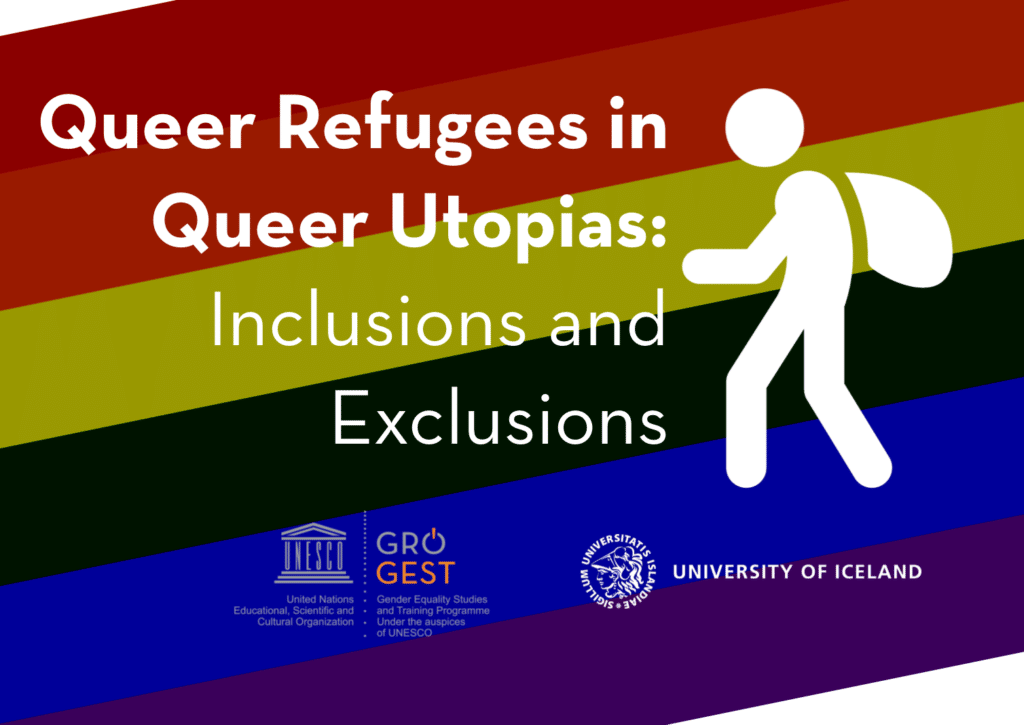Queer Refugees in Queer Utopias: Inclusions and Exclusions
Málstofustjóri: Thomas Brorsen Smidt
Queer Refugees in ...

People who flee persecution because of their sexual orientation or gender identity and expression (SOGIE) constitute a particularly vulnerable group of migrants. In 2021, the GEST Programme at the University of Iceland and affiliated researchers from social work, anthropology, sociology and gender studies were awarded a RANNÍS grant for the project Queer Refugees in Queer Utopias: Inclusions and Exclusions. This seminar will introduce the project and its methodology, in addition to some of the issues under research, such as SOGIE refugee experience of settlement support and social interactions and how digital and social media plays a role in these processes. Seminar participants are encouraged to provide input on the project plan and methodology. Moreover, the seminar will feature presentations on queer migration in Iceland more broadly, in addition to initial comparative field research from Italy and Greece. This seminar is part of series that will run annually for the duration of the project.
Sjá ágrip erindanna hér fyrir neðan.
Introducing the Project: Queer Refugees in Queer Utopias
In this presentation, principle investigators Guðbjörg Ottósdóttir and Thomas Brorsen Smidt outline the research project Queer Refugees in Queer Utopias: Inclusions and Exclusions. The project aims to create new relevant knowledge that will address gaps in existing research and help improve policies and practices on this issue in Iceland; a country that is broadly perceived to be one of the most queer-friendly nations on earth. To do this, more knowledge on how SOGIE refugees experience settlement, deportation, reception and support from both the Icelandic asylum system, municipal social services and NGO’s and advocacy groups, and their own diasporas is needed. It is also becoming increasingly important to know more about how digital and social media plays a role in these processes. The methodology for the project relies on engaged ethnography to carry out and analyze 40-50 in-depth interviews with four different stakeholder groups: SOGIE refugees, professionals in the asylum system in Iceland, professionals in municipality social services and professionals and volunteers in NGO services and advocacy groups. Drawing on an established international research network, the project also seeks to compare experiences of SOGIE refugees in respectively Iceland and the Netherlands to further develop the theoretical framework around the concept of ‘queer utopias.’
Queer migrations: Homotransnationalism and migrant hierarchy in Iceland
This presentation is based on a study that examines three distinct but interconnected groups of queer migrations to Iceland, from the Global South, Central and Eastern Europe and Global North. Global south migrants often developed a bifocal worldview and an experience of racism and a sense of (un)belonging were highlighted. Migration further materialised new paths and practices regarding gender and sexuality. Regarding migrants from the Global North, themes of privilege, whiteness, and masculinity were highlighted along with the in betweenness of belonging, and a longing for a queer futurism. Finally, in the findings related to queer migrations from Central and Eastern Europe, the overreaching theme was ‘exclusionary moments’ while sub-themes relate to social class (dis)identification; shame and emotional work; and participants’ sense of (un)belonging. Thus, the findings show that managing information about one’s sexual orientation and gender identity can pose challenges in any context. But the relational process of racialisation and being labelled as the immigrant other seems, in some cases, impossible to overcome. This othering of immigrants is embedded in racial, cultural, and class hierarchies, as white migrants from the Global North experience inclusion and belonging unlike that of non-white migrants from the Global South. While interlocutors from Central and Eastern Europe are, in many cases, automatically attributed a subordinated subject position, compared to other white immigrants.
“Who will look for me if I disappear”? Tactical networks among (un)settled queers in southern European states
Queer lives have long been entangled with (un)settlements. Desiring utopian life of safety and prosperity, some LGBTQI+ people move to Southern European countries through accessible trajectories. However, these countries have proven unstable regarding rights to residency and open queerness. Thus, while some arrive to Europe as asylum seekers, others seek refuge later. This paper is based on ethnographic fieldworks, collectively conducted since 2012, among refugee activists in Greece, Italy, and Germany. They include dialogues with fourteen queer activists, and five in-depth interviews with gay migrants. Mirroring recent publications, the queer interlocutors in these studies have described their existence of liminal rights, racist surveillance, and social exclusion as being stuck in a queer death midst the necropolitics of the state. This is exemplified by southern states assign the care of asylum seekers to religiously induced and queerphobic NGOs. Thus, queer interlocutors described seeking inclusive spaces for safety, solidarity and companionship. In these spaces, networks were tactically built for survival strategies and ongoing mobility. The few supporting allies found, however, were also stuck within precarity and offered only fractional and temporal support. The findings show that (un)settled queer people must continually embody alertness to navigate exclusionary moments in and around solidarity spaces in south Europe.
